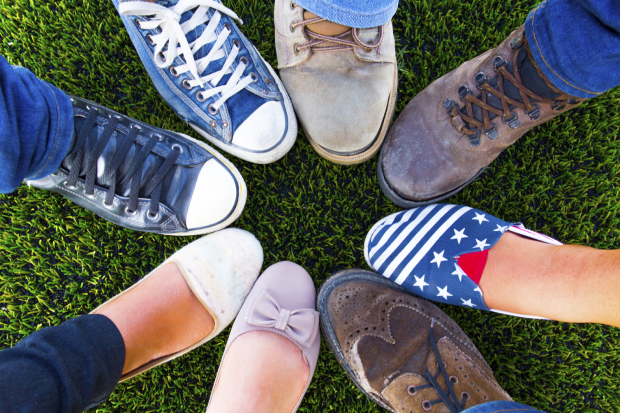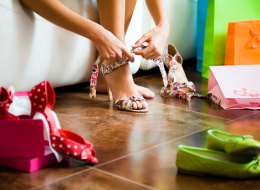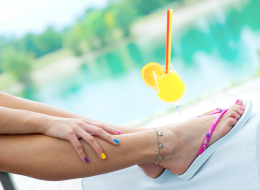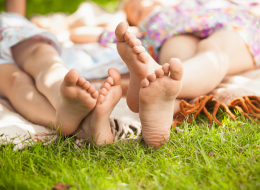Myth Busters The Lies We Tell Ourselves About Shoes
We try all kinds of ways to talk ourselves into wearing shoes that are bad for us. Here are a few common fibs we’re all guilty of as well as the truths that dispel the myths: barefoot shoes, flip flops, Crocs, flats vs. heels, and more.
Shoe Lie #1: New Shoes Always Feel Tight; They’ll Stretch
We’ve all told ourselves this whopper in an attempt to squeeze our feet into the latest stiletto trend, but unless the shoes are made of 100 percent natural leather or suede (both the outside and the lining), there’s no way they will realistically stretch enough to feel comfortable. Besides, shoe experts say even real leather and suede shoes only stretch about a quarter of a shoe size — mere millimeters.
Truth
Never buy shoes that hurt or feel too tight because they'll most likely not stretch into a comfortable fit over time.
Shoe Lie #2: Athletic Shoes Are Good For the Feet
Many people assume that athletic shoes are the healthiest shoe option because they’re shock absorbent and give good arch and heel support. However, while they are usually a good shoe choice, they aren’t perfect. Not only do athletic shoes compromise your natural gait, they often elevate your heel and can pinch your toes together. This is why many podiatrists are now recommending minimalist footwear that mimics walking barefoot. This relatively new type of walking and running shoe reduces the chances of a person developing an abnormal gait (pronation) and allows the toes better flexibility and extension.
Additionally, choosing the wrong type of athletic shoe for the activity you’re engaging in can come with detrimental effects including twisted ankles, plantar fasciitis and bunions.
Truth
All athletic shoes are designed differently and offer different foot benefits, so do your research before investing in a pair. Just because it's a pair of athletic shoes doesn't mean it's a healthy or comfortable shoe option.
Shoe Lie # 3: Flip Flops Are Comfortable
They’re an easy, go-to summer staple and we’ve all told ourselves that flip flops are comfy. But in reality, your foot is constantly flexing in an attempt to grip onto the dang things, which can ultimately lead to muscle cramps, torn ligaments in the arch of the foot (plantar fasciitis) and hammertoes. The casual summer footwear option also leads to cracked heels (heel fissures), corns and calluses — all of which are definitely not considered comfortable.
Truth
Flip flops are only comfortable if worn for short periods of time and because they offer zero cushioning and arch support, should be avoided whenever possible.
READ MORE: 10 Reasons Why You Should Break Up With Your Flip Flops
Shoe Lie # 4: Flats Are Better Than Heels
With all of the warnings floating around about the dangers of wearing high heels, many women assume that wearing flats is the better option. This is true in some cases, but not always. Many flats on the market have absolutely no cushioning or arch support, they often cause the foot to roll inward, and they create strain on the leg muscles — meaning they could be just as detrimental to your foot health as high heels.
Truth
Shoes with a small, 1-inch heel give your feet better support than flats and are therefore considered a better option, podiatrists say.
Shoe Lie #5: Comfort Shoes Are Designed By Engineers With Foot Health In Mind
This is one of the most believed shoe myths out there but couldn’t be further from the truth. Many mainstream comfort shoe brands tout their optimized shoes, but more often than not, they’re designed with aesthetics — not foot health — in mind. What will look good on the shelf? What will sound good to the consumer? Foot health is often a pretty low priority.
Truth
The only way to ensure that a shoe is designed with maximum foot health in mind is to get specially designed shoes called orthotics. Orthoses properly control body alignment, protect and support foot and leg injuries and correct and/or accommodate foot deformities like bunions, hammertoes and flatfeet.
RELATED: Podiatrists Warn Crocs Are Actually Bad For Your Feet
Shoe Lie #6: A Good Quality Pair of Shoes Will Last Forever
High fashion magazines will have you believe that if you invest in a pricy pair of well-made designer shoes, they will last forever. Unfortunately for your pocketbook, this is not true. While the shoes may look good for years to come if given proper care, there’s no way to avoid the support and stability of the shoes from breaking down. You can try taking the shoes to a cobbler or cordwainer each year for general maintenance, but short of completely replacing the sole, insole and any other supportive devices the shoe offers, they will wear out and become hazardous to the health of your feet. Worn-in shoes can lead to pronation problems, bunions, plantar fasciitis and more.
Truth
Shoes need constant replacing to ensure they are offering you the best foot and arch support possible.
Shoe Lie #7: When You Find a Good Pair of Shoes, Stick to Them
We’ve all tried to pack light before a vacation by planning outfits that revolve around just one pair of shoes or have fallen in love with a stylish yet comfortable pair of shoes that we wear over and over and over again. However, experts warn this is a really bad idea. Frequently wearing the same pair of shoes (and wearing the same pair of shoes two days in a row) can lead to a host of foot problems, including bromodosis (smelly feet), bunions and misalignment issues.
Truth
Try to mix up the shoes that you wear, and avoid wearing the same pair of shoes two days in a row.
![]()
Notice concerning medical entries:
Articles having medical content shall serve exclusively for the purpose of general information. Such articles are not suitable for any (self-) diagnosis and treatment of individual illnesses and medical indications. In particular, they cannot substitute for the examination, advice, or treatment by a licensed physician or pharmacist. No replies to any individual questions shall be effected through the articles.






